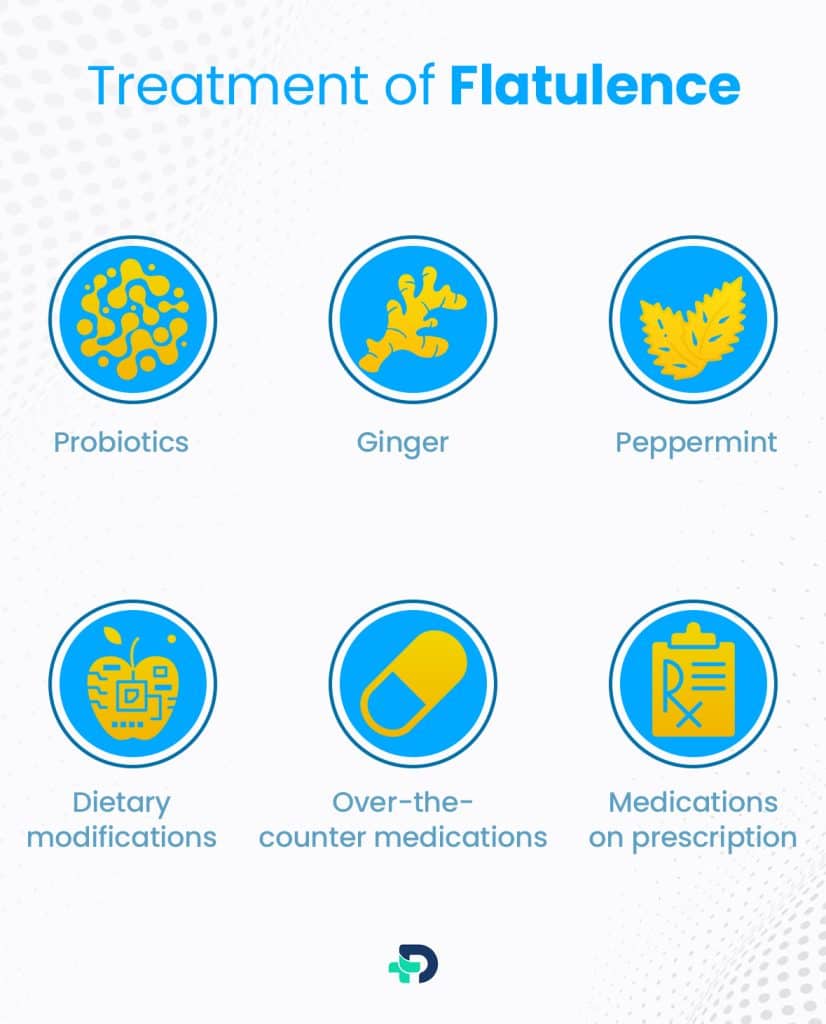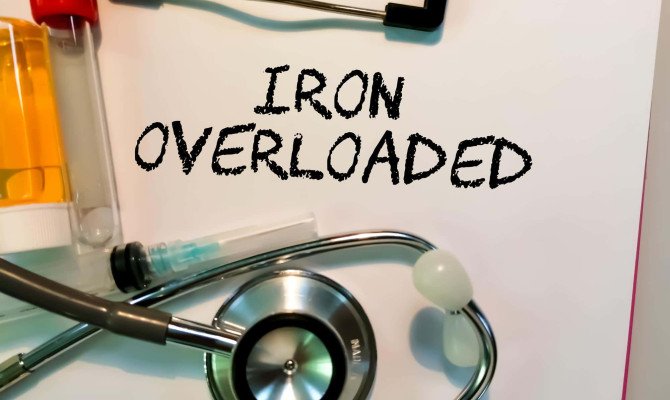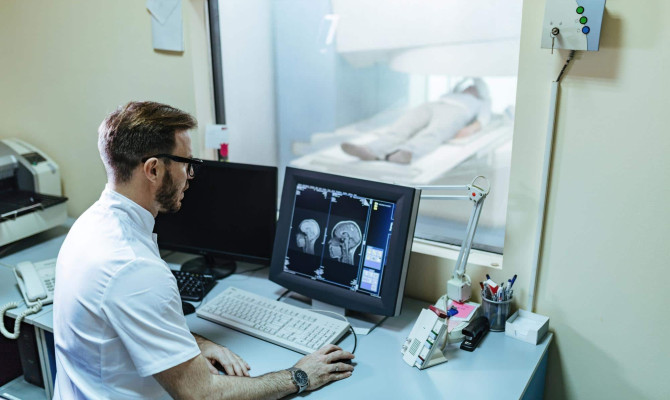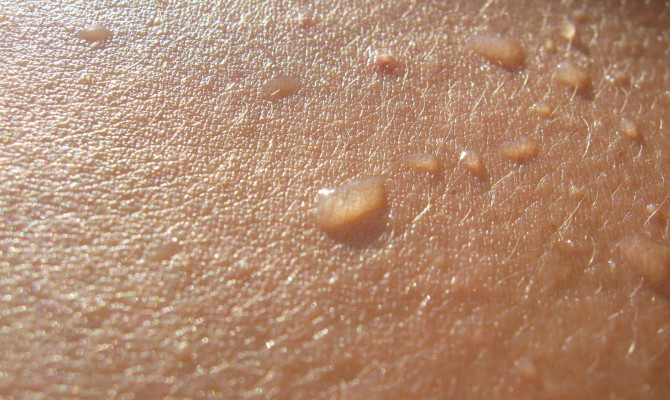Flatulence : Causes, symptoms and Management

- Flatulence
- 17 Aug 2023
Overview
What is Flatulence?
The natural bodily process of flatulence also called passing gas or farting, includes expulsing gas from the digestive system through the rectum. Few body processes are as commonplace but frequently taboo as farts. Everyone suffers the common and occasionally embarrassing phenomenon, whether we confess it or not.1Overview| Researched based study from Nlm.nih.gov
The article aims to enlighten readers on an intriguing topic of flatulence. We will go into the biology underlying this biological process, its causes, and even the social stigmas it carries.

Symptoms
Flatulence symptoms
- Excessive gas
- Abdominal bloating
- Release of air or gas through the mouth
- Gurgling or rumbling sounds in the abdomen
- Foul odors
While excessive or persistent gas is not a disease in and of itself, it can occasionally be associated with symptoms that point to underlying health problems. Here are a few of the typical symptoms:
Excessive Gas
- The most noticeable signs are frequent gastric emptying. This can cause the rectum to leak gas, which can be noisy or odorous.
Discomfort in the abdomen
- The buildup of gas in the digestive tract frequently causes bloating, a sense of fullness, or abdominal distension in humans.1Symptoms| Researched based study from Nlm.nih.gov From minor to severe, this discomfort may be accompanied by abdominal pain or cramping.
Belching
- Frequent belching, the expulsion of air or gas via the mouth, is a side effect of having too much gas in addition to flatulence. It frequently happens as a way for the body to get rid of extra gas in the stomach.
Abdomen sounds
- The gut may gurgle or rumble as a result of too much gas. These sounds, sometimes known as stomach growls, are brought on by the passage of gas and liquids through the digestive system.
Foul odors
- Although passing gas is a normal body function, the expelled gas can occasionally smell unpleasant. The Sulphur compounds, including hydrogen sulfide, created by bacteria in the intestines during digestion are usually blamed for the odor.1Symptoms| Researched based study from Nlm.nih.gov
Excessive flatulence at night
- You might unintentionally swallow small amounts of air while eating, drinking, or conversing during the day.
- Your digestive system may hold onto this air, which could lead to gas development. Some people may find that specific sleeping positions help relieve trapped gas.1Symptoms| Researched based study from Nlm.nih.gov
Causes
Flatulence causes
Swallowed air
- Unintentionally swallowing air when eating or drinking can build up in the digestive tract and cause gas.1Causes| Researched based study from Nlm.nih.gov This can occur when eating too quickly, chewing gum, consuming carbonated beverages, or using a straw.
Diet
- In the digestive tract, several meals are known for generating gas production. These include artificial sweeteners, fizzy beverages, high-fiber meals, beans, lentils, broccoli, cabbage, onions, and garlic.
- The carbohydrates in these foods are complex for the small intestine to digest, which causes fermentation by bacteria in the large intestine and the creation of gas.
Disordered digestion
- Increased gas production can be a symptom of diseases like irritable bowel syndrome (IBS), lactose intolerance, celiac disease, and other digestive disorders.1Causes| Researched based study from Nlm.nih.gov
- In such cases, the body could struggle to digest specific food ingredients, resulting in excessive flatulence,
Gut microbes
- The billions of bacteria that make up human gut microbiota are essential to digestion.
- Due to digesting specific carbohydrates or fibers in the colon, several species of bacteria release gas.
- The gut bacteria may be out of balance, which might cause more gas and farts.1Causes| Researched based study from Nlm.nih.gov
Supplements and medications
- The equilibrium of microorganisms in the digestive system can be upset by some medications, including antibiotics, increasing gas output.1Causes| Researched based study from Nlm.nih.gov
- Furthermore, some dietary supplements, including fiber or probiotics, can result in gas because they alter the balance of intestinal flora.
Medical conditions
- Underlying medical issues can occasionally cause excessive gas and farts.
- Gastroenteritis, inflammatory bowel illness, bacterial overgrowth in the small intestine, and digestive blockages are some conditions that might impair regular digestion and increase gas production.1Causes| Researched based study from Nlm.nih.gov
Diagnosis
Diagnosis of Flatulence
Medical history
- Usually, a medical expert will discuss your symptoms and medical background. They could enquire about your underlying medical disorders, their frequency and severity, accompanying symptoms, eating habits, and lifestyle choices.
Physical evaluation
- A physical examination may be performed to look for any anomalies connected to increased gas production, such as discomfort or symptoms of abdominal distension.
Food diary
- Keeping a thorough food journal will help you find probable dietary causes. This involves keeping track of the meals and drinks ingested and the occurrence and intensity of symptoms.
Diet of elimination
- A doctor may occasionally advise an exclusion diet to identify particular dietary intolerances or sensitivities causing excessive gas production.
- This involves temporarily removing specific foods from your diet and then gradually returning them to see whether your symptoms change.
Breath tests
- It may help diagnose disorders that cause flatulence, such as lactose intolerance or bacterial overgrowth in the small intestine.
- These tests involve ingesting a specific drug and measuring the gases released into the breath.
Stool analysis
- An investigation of the stool may be advised to look for any anomalies or indications of inflammation when there is a suspicion of underlying digestive diseases or infections.
Imaging studies
- When necessary, endoscopic procedures like a colonoscopy or imaging tests like abdominal X-rays or ultrasounds may be requested to assess the digestive tract and rule out structural issues.5Diagnosis| Researched based study from Niddk.nih.gov
Treatment

Treatment of Flatulence
Dietary modifications
- Dietary changes can frequently lessen flatulence. It is wise to recognize and stay away from foods like beans, lentils, broccoli, cabbage, onions, garlic, carbonated beverages, high-fat foods, and artificial sweeteners that are known to produce gas.
Herbal remedies
Ginger
- Ginger has long been used to improve digestion and reduce bloating. Try consuming ginger tea or incorporating raw ginger into your meals.
Peppermint
- It has been discovered to ease the muscles in the digestive system, which might lessen flatulence. After speaking with a doctor, you can drink peppermint tea or take peppermint oil pills.3Treatment| Researched based study from Nlm.nih.gov
Probiotics
- They are beneficial microbes that may help reestablish the equilibrium of the gut microbiota. They could be suggested to treat symptoms brought on by excessive gas production. They can be taken as supplements or in specific foods.
Over-the-counter medications
- Available antacids or simethicone-containing medications may reduce gas-related bloating and discomfort—these drugs dissolve gas bubbles in the digestive system. For the odor of hydrogen sulfides in gas, bismuth subgallate is frequently used.
Medications on prescription
- Sometimes, a doctor may prescribe medications to treat particular underlying diseases, such as lactose intolerance or inflammatory bowel disease (IBD), to manage and treat the condition.2Treatment| Researched based study from Nlm.nih.gov
Lifestyle changes
Lifestyle changes to avoid Flatulence
Healthy lifestyle choices can improve digestion and lessen flatulence.
Stress reduction techniques
- The use of stress reduction strategies, regular exercise, and appropriate hydration can all enhance general health.
Dietary changes
- Consuming smaller, more frequent meals and chewing food thoroughly may also aid digestion.
- Avoiding spicy or fried foods that may increase the bloating chances.
- Eat slowly, thoroughly chew your food, and avoid gulping down your meals.
- Several food groups, including lactose and gluten, cause intolerance in some people.
- Identify any possible food intolerances and steer clear of the offending foods.
Smoking
- It might cause air to enter your digestive tract, making things worse. Your overall digestive health may improve if you stop smoking.
Be mindful when swallowing air.
- Avoid practices including eating too quickly, chewing gum, consuming carbonated beverages, and drinking via a straw that encourages air swallowing.4Lifestyle changes| Researched based study from Nhs.uk
Complications
Flatulence complications
This condition is often not dangerous and does not frequently cause complications. But occasionally, excessive or ongoing flatulence can signify a more profound illness. Here are some potential issues that could develop:
Digestive disorders
- It can be a sign of several digestive problems, including celiac disease, small intestinal bacterial overgrowth (SIBO), irritable bowel syndrome (IBS), and inflammatory bowel disease (IBD).
Psychological and social effects
- Frequent or uncontrollable gas can make people anxious or depressed in social settings, negatively impacting their general well-being.
Obstructed intestines
- Rarely, significant gas buildup can cause intestinal blockage, particularly in persons with problems like a hernia or intestinal adhesions.5Complications| Researched based study from Niddk.nih.gov
Takeaway
Key Takeaways
A frequent digestive problem that can be uncomfortable and embarrassing is flatulence. While the odd burp is acceptable, regular, or severe, flatulence may indicate a medical issue that needs to be addressed.
You should always seek expert medical assistance if you have concerns about your flatulence or if it is accompanied by other unsettling symptoms, even though home treatments and lifestyle changes might be beneficial.
Any feedback on this article?
 This Articles content was accurate
This Articles content was accurate Very Informative Article
Very Informative Article I have a question or a comment
I have a question or a comment
 This article contains inaccurate content
This article contains inaccurate content This article was not helpful
This article was not helpful I have a question or a comment
I have a question or a comment
We appreciate your helpful feedback!
Checkout our social pages
References
-
National Library of Medicine
Gas and Bloating | Overview | Symptoms | Causes
-
National Library of Medicine
Prevention and Treatment of Flatulence From a Traditional Persian Medicine Perspective | Treatment
-
National Library of Medicine
Flatulence--causes, relation to diet and remedies | Treatment
-
National Health Service
Farting (flatulence) | Lifestyle Changes
-
National Institute of Diabetes and Digestive and Kidney Diseases
Diagnosis of Gas in the Digestive Tract | Diagnosis | Complications





































